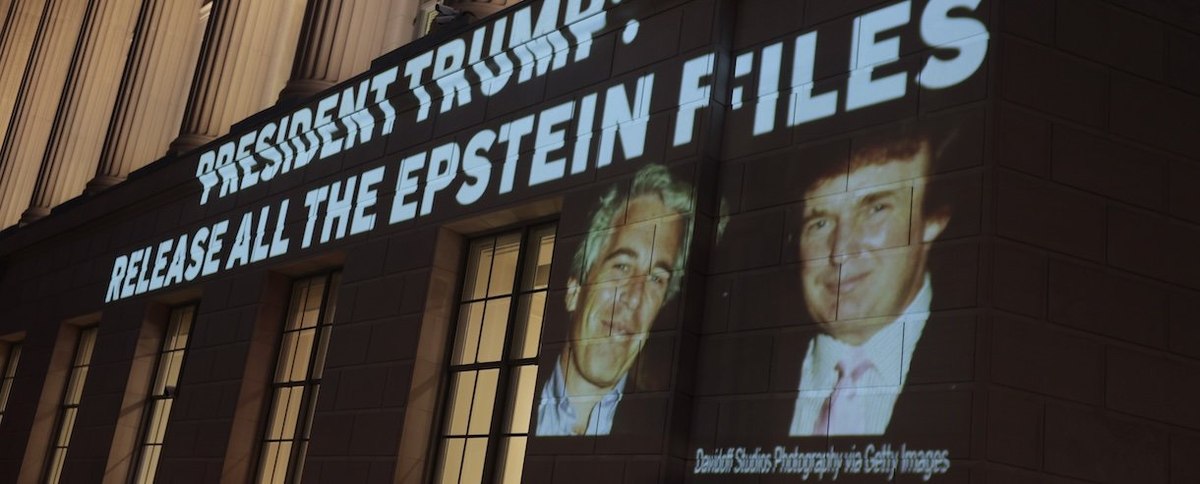This week’s Economist/YouGov poll covers…
- Trump's continuing slump in his approval
- How the Jeffrey Epstein investigation unites Democrats and Republicans
- Fewer Democrats believing that Russia interfered in the 2016 election
- Scant support for cutting environmental agencies
- Persistent doubts about Trump's tariffs
Views of Donald Trump
- 40% of U.S. adult citizens strongly or somewhat approve of the job Donald Trump is doing as president, and 55% disapprove
- This net disapproval — the percent who approve minus the percent who disapprove — of -15 is the lowest Trump has received in his second term
- Trump's overall net approval of -15 is worse than his net approval of handling jobs and the economy (-11) and immigration (-6), but better than his handling of abortion (-19), climate change and the environment (-20), and inflation/prices (-25)
- Net approval of his handling of foreign trade (-15) and of education (-15) are similar to his overall net approval
Investigations into Jeffrey Epstein
- Americans are nearly three times as likely to strongly or somewhat disapprove as they are to approve of Trump's handling of the Epstein investigation (61% vs. 21%)
- Republicans are more likely to approve than disapprove of Trump's handling of the Epstein investigation (49% vs. 28%). Nearly all Democrats (90%) disapprove and only 5% approve
- The vast majority (82%) of Americans — including 91% of Democrats and 76% of Republicans — believe that the government should release all documents it has about the Jeffrey Epstein case; only 4% say it shouldn't and 14% are unsure
- Two-thirds of Americans — including 86% of Democrats and 45% of Republicans — think the government is covering up evidence it has about Epstein. Only 12% of Americans — including 4% of Democrats and 26% of Republicans — think it isn't; 21% aren't sure
- The share of Republicans who think the government is covering up information on Epstein has fallen 8 points since the previous week's poll, while the share who think it isn't has risen 12 points
- 46% of Americans think Trump was involved in crimes allegedly committed by Epstein; 32% believe he wasn't
- Very few Americans — 4% — are in favor of Trump pardoning Ghislaine Maxwell; 64% are opposed and 32% say they aren't sure
- Many Republicans (37%) and Independents (37%) are not sure, but far more in each group disapprove than approve of pardoning Maxwell
2016 Russian interference
- Trump and members of his administration have recently scrutinized and called into question the findings of previous investigations which established that Russia attempted to interfere in the 2016 election
- The share of Americans who believe that Russia interfered with the 2016 presidential election has fallen in recent years. 42% of Americans believe there was Russian interference in the 2016 election; in 2018, the first time we asked this question, 50% did. Belief in Russian interference had fallen to 46% by 2021 (the last time the question was asked), and has declined slightly since
- The drop has been most dramatic among Democrats: 61% of Democrats believe Russian interference occurred in 2016, down from 75% in 2021 and 78% in 2018
- Among those who believe Russia interfered in 2016, 59% — including 65% of Democrats and 46% of Republicans — think its interference affected the outcome of the election; 24% of Americans overall think so. In 2018, when the question was first asked, slightly more of those who believed in interference (68%) — and more Americans overall (34%) — thought the election's outcome was affected
Environmental regulation
- The Trump administration is attempting to overturn an Environmental Protection Agency (EPA) finding that greenhouse-gas emissions threaten human life; if successful, the administration's move would reduce the agency's ability to regulate such gases
- Americans overall are more likely to want restrictions on greenhouse gas emissions to be expanded (37%) rather than reduced or eliminated (24%); 21% think they should be kept as is
- Americans are also more likely to prefer expanding rather than reducing or eliminating various U.S. government agencies that are related to the environment. This includes the Federal Emergency Management Agency (41% want it expanded vs. 17% who want it reduced or eliminated), the EPA (39% vs. 23%), the National Park Service (35% vs. 10%), and the National Oceanic and Atmospheric Administration (32% vs. 15%)
- Half (50%) of Americans believe the U.S. government isn't doing enough to address climate change; 20% think it is doing about the right amount and 17% think it is doing too much
- The share who say the government is doing too much to address climate change has fallen since the end of Joe Biden's administration, to 17% from 25% in 2024 and 26% in 2023
Tariffs
- Twice as many Americans would prefer for tariffs on foreign goods to be decreased as want them to be increased (41% vs. 18%); 23% want them to be kept the same
- Most Americans (54%) say that American consumers are hurt most by tariffs on U.S. imports; far fewer say foreign manufacturers (22%), foreign consumers (4%), and American manufacturers (3%) are hurt most; 3% say none of those four groups are hurt most
- 32% say none of American and foreign consumers and manufacturers benefit most from tariffs on U.S. imports. 28% say American manufacturers are the main beneficiaries, while 11% say American consumers are, 6% say foreign manufacturers are, and 1% say foreign consumers are
- 71% of Americans think that Trump's tariffs will increase the prices they pay, including 43% who expect they will increase prices a lot and 28% a little. Majorities of Democrats (87%) and Republicans (55%) think the tariffs will lead to price increases
- Only 9% of Americans — including 5% of Democrats and 16% of Republicans — expect tariffs will decrease prices
- About one-third (31%) of Americans are unsure how many of the tariffs announced by Trump earlier this year have been enacted
- 33% believe that few or none of Trump's tariffs have gone into effect, while 15% think about half of them have and 21% say all or most have
- Both Democrats and Republicans are somewhat more likely to say that few or none of the tariffs have been enacted than to say that all or most have
— Carl Bialik contributed to this article
Throughout this report, some numbers may appear to be off by 1 because of rounding
See the toplines and crosstabs for the July 25 - 28, 2025 Economist/YouGov Poll
Methodology: The poll was conducted among 1,777 U.S. adult citizens. Respondents were selected from YouGov’s opt-in panel to be representative of U.S. adult citizens. A random sample (stratified by gender, age, race, education, geographic region, and voter registration) was selected from the 2019 American Community Survey. The sample was weighted according to gender, age, race, education, 2024 presidential vote, 2020 election turnout and presidential vote, baseline party identification, and current voter registration status. 2024 presidential vote, at time of weighting, was estimated to be 48% Harris and 50% Trump. Demographic weighting targets come from the 2019 American Community Survey. Baseline party identification is the respondent’s most recent answer given around November 8, 2024, and is weighted to the estimated distribution at that time (31% Democratic, 32% Republican). The margin of error for the overall sample is approximately 3.5%.
Image: Getty (Anna Moneymaker / Staff)
What do you really think about President Trump, American politics in general, and everything else? Share your reality, join the YouGov panel, and get paid to share your thoughts. Sign up here.
















